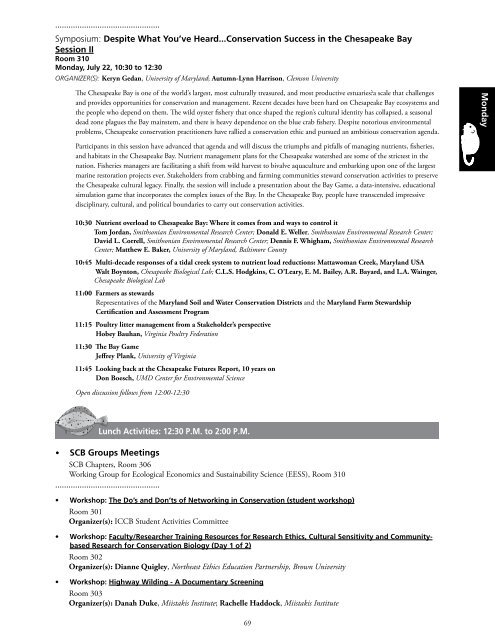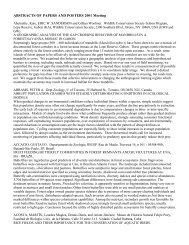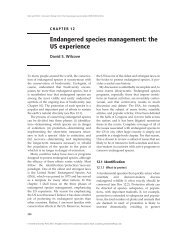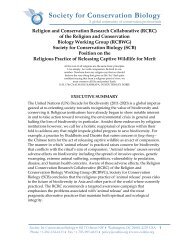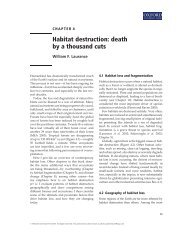ICCB 2013 Program - Society for Conservation Biology
ICCB 2013 Program - Society for Conservation Biology
ICCB 2013 Program - Society for Conservation Biology
You also want an ePaper? Increase the reach of your titles
YUMPU automatically turns print PDFs into web optimized ePapers that Google loves.
...............................................<br />
Symposium: Despite What You’ve Heard...<strong>Conservation</strong> Success in the Chesapeake Bay<br />
Session II<br />
Room 310<br />
Monday, July 22, 10:30 to 12:30<br />
Organizer(s): Keryn Gedan, University of Maryland; Autumn-Lynn Harrison, Clemson University<br />
The Chesapeake Bay is one of the world’s largest, most culturally treasured, and most productive estuariesa scale that challenges<br />
and provides opportunities <strong>for</strong> conservation and management. Recent decades have been hard on Chesapeake Bay ecosystems and<br />
the people who depend on them. The wild oyster fishery that once shaped the region’s cultural identity has collapsed, a seasonal<br />
dead zone plagues the Bay mainstem, and there is heavy dependence on the blue crab fishery. Despite notorious environmental<br />
problems, Chesapeake conservation practitioners have rallied a conservation ethic and pursued an ambitious conservation agenda.<br />
Monday<br />
Participants in this session have advanced that agenda and will discuss the triumphs and pitfalls of managing nutrients, fisheries,<br />
and habitats in the Chesapeake Bay. Nutrient management plans <strong>for</strong> the Chesapeake watershed are some of the strictest in the<br />
nation. Fisheries managers are facilitating a shift from wild harvest to bivalve aquaculture and embarking upon one of the largest<br />
marine restoration projects ever. Stakeholders from crabbing and farming communities steward conservation activities to preserve<br />
the Chesapeake cultural legacy. Finally, the session will include a presentation about the Bay Game, a data-intensive, educational<br />
simulation game that incorporates the complex issues of the Bay. In the Chesapeake Bay, people have transcended impressive<br />
disciplinary, cultural, and political boundaries to carry out conservation activities.<br />
10:30 Nutrient overload to Chesapeake Bay: Where it comes from and ways to control it<br />
Tom Jordan, Smithsonian Environmental Research Center; Donald E. Weller, Smithsonian Environmental Research Center;<br />
David L. Correll, Smithsonian Environmental Research Center; Dennis F. Whigham, Smithsonian Environmental Research<br />
Center; Matthew E. Baker, University of Maryland, Baltimore County<br />
10:45 Multi-decade responses of a tidal creek system to nutrient load reductions: Mattawoman Creek, Maryland USA<br />
Walt Boynton, Chesapeake Biological Lab; C.L.S. Hodgkins, C. O’Leary, E. M. Bailey, A.R. Bayard, and L.A. Wainger,<br />
Chesapeake Biological Lab<br />
11:00 Farmers as stewards<br />
Representatives of the Maryland Soil and Water <strong>Conservation</strong> Districts and the Maryland Farm Stewardship<br />
Certification and Assessment <strong>Program</strong><br />
11:15 Poultry litter management from a Stakeholder’s perspective<br />
Hobey Bauhan, Virginia Poultry Federation<br />
11:30 The Bay Game<br />
Jeffrey Plank, University of Virginia<br />
11:45 Looking back at the Chesapeake Futures Report, 10 years on<br />
Don Boesch, UMD Center <strong>for</strong> Environmental Science<br />
Open discussion follows from 12:00-12:30<br />
lunch activities: 12:30 p.m. to 2:00 p.m.<br />
• SCB Groups Meetings<br />
SCB Chapters, Room 306<br />
Working Group <strong>for</strong> Ecological Economics and Sustainability Science (EESS), Room 310<br />
...............................................<br />
• Workshop: The Do’s and Don’ts of Networking in <strong>Conservation</strong> (student workshop)<br />
Room 301<br />
Organizer(s): <strong>ICCB</strong> Student Activities Committee<br />
• Workshop: Faculty/Researcher Training Resources <strong>for</strong> Research Ethics, Cultural Sensitivity and Communitybased<br />
Research <strong>for</strong> <strong>Conservation</strong> <strong>Biology</strong> (Day 1 of 2)<br />
Room 302<br />
Organizer(s): Dianne Quigley, Northeast Ethics Education Partnership, Brown University<br />
• Workshop: Highway Wilding - A Documentary Screening<br />
Room 303<br />
Organizer(s): Danah Duke, Miistakis Institute; Rachelle Haddock, Miistakis Institute<br />
69


